unit2现代大学英语精读3PPT课件
- 格式:ppt
- 大小:2.75 MB
- 文档页数:15
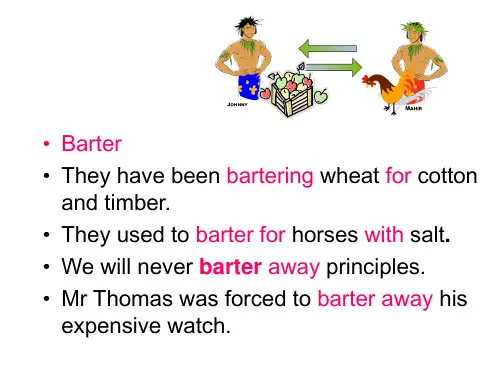
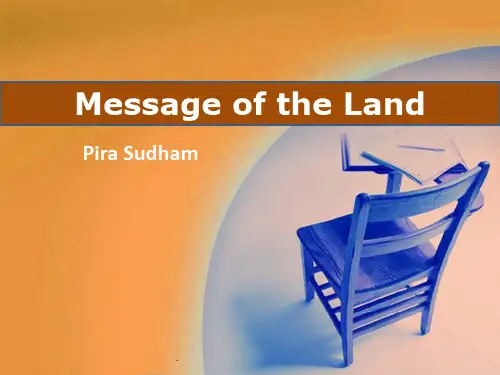
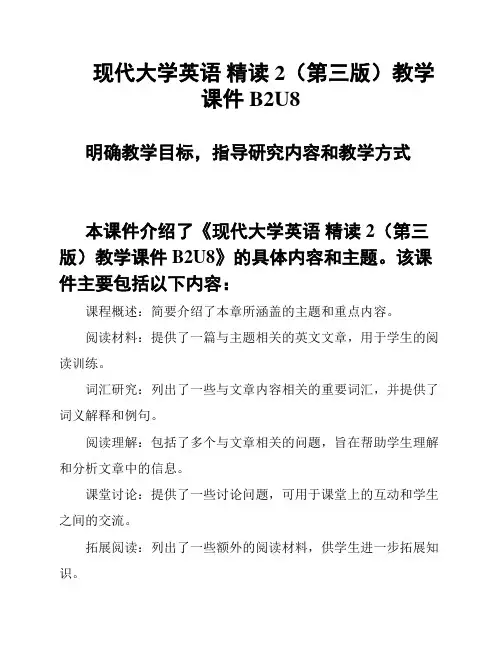
现代大学英语精读2(第三版)教学课件B2U8明确教学目标,指导研究内容和教学方式本课件介绍了《现代大学英语精读2(第三版)教学课件B2U8》的具体内容和主题。
该课件主要包括以下内容:课程概述:简要介绍了本章所涵盖的主题和重点内容。
阅读材料:提供了一篇与主题相关的英文文章,用于学生的阅读训练。
词汇研究:列出了一些与文章内容相关的重要词汇,并提供了词义解释和例句。
阅读理解:包括了多个与文章相关的问题,旨在帮助学生理解和分析文章中的信息。
课堂讨论:提供了一些讨论问题,可用于课堂上的互动和学生之间的交流。
拓展阅读:列出了一些额外的阅读材料,供学生进一步拓展知识。
总结与复:对本课内容进行总结,并提供一些复建议。
通过研究《现代大学英语精读2(第三版)教学课件B2U8》,学生可以提高阅读能力,扩展词汇量,并深入了解与主题相关的知识。
本文档旨在探讨适合《现代大学英语精读2(第三版)》教材的教学方法,并包括以下内容:多媒体教学:通过利用多媒体资源,如投影仪、音频和视频材料,可以增加学生的参与度和互动性,提高他们的英语阅读能力。
教师可以结合文本内容,展示相关的图片、图表和视频片段,以帮助学生更好地理解和记忆。
讨论活动:通过组织小组讨论或全班讨论,可以促进学生之间的交流和合作。
教师可以提出问题,引导学生思考并发表自己的观点。
这不仅可以提高学生的口语表达能力,还可以培养他们的批判思维和分析能力。
案例分析:选取与教材相关的案例进行分析和讨论。
通过分析实际案例,学生可以将所学知识应用到实际情境中,提高他们的综合运用能力。
练与评估:在教学过程中,教师可以设计各种练和评估活动。
例如,阅读理解题、写作练、小组演讲等。
这些活动可以帮助学生巩固所学知识,并检验他们的研究成果。
通过采用上述教学方法,可以增强学生对《现代大学英语精读2(第三版)》教材的理解和应用能力,提高他们的研究效果和兴趣。
通过采用上述教学方法,可以增强学生对《现代大学英语精读2(第三版)》教材的理解和应用能力,提高他们的学习效果和兴趣。
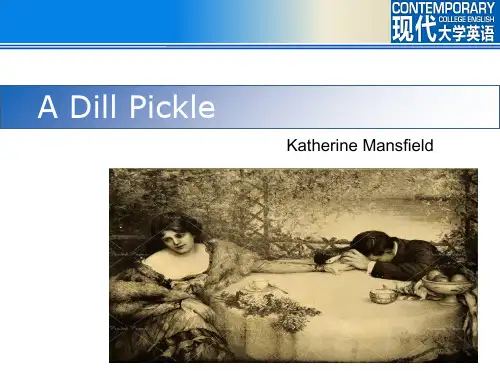
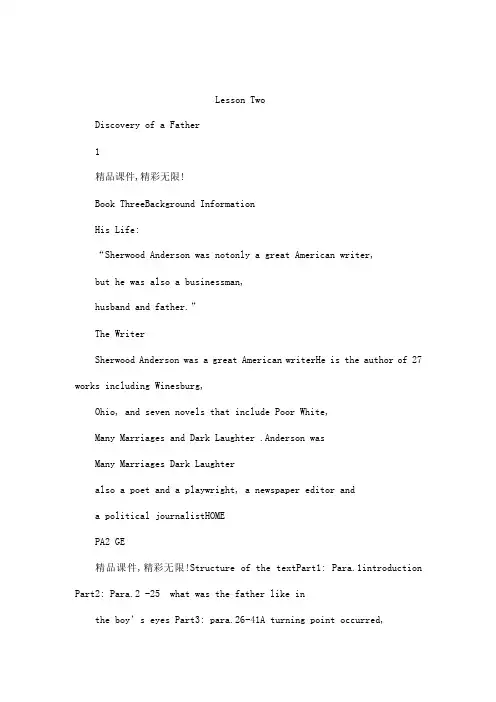
Lesson TwoDiscovery of a Father1精品课件,精彩无限!Book ThreeBackground InformationHis Life:“Sherwood Anderson was notonly a great American writer,but he was also a businessman,husband and father.”The WriterSherwood Anderson was a great American writerHe is the author of 27 works including Winesburg,Ohio, and seven novels that include Poor White,Many Marriages and Dark Laughter .Anderson wasMany Marriages Dark Laughteralso a poet and a playwright, a newspaper editor anda political journalistHOMEPA2 GE精品课件,精彩无限!Structure of the textPart1: Para.1introduction Part2: Para.2 -25 what was the father like inthe boy’s eyes Part3: para.26-41A turning point occurred,and then the boy changed the opinion of hisfather completely.3精品课件,精彩无限!Lesson 2 ? Discovery of a Father Oral Workshop Oral WorkshopQuestions to help comprehension andappreciation of the text What ‘s your understanding of “ fatherswant their sons to be what they themselvescannot be, but it also works the other way?”To be continued on the next page.4精品课件,精彩无限!Lesson 2 ? Discovery of a FatherOral Workshop Oral WorkshopTopics for Debating1Like father, like son2. If a father loves his child, he should do allhe can for the child.3. Discuss the importance of “peer effect” inlight of the following storyThe end of Oral Work.5精品课件,精彩无限!What was the father like in theboy’s eyes? List his father's characteristics one by one,and try to explain them with some examples.6精品课件,精彩无限!Retell in your own wordsHe was ridiculous. / He was a clown? He was foolish He was a windbag He was irresponsible.7精品课件,精彩无限!Why was this incident soimportant What happened one day that changed theauthor’s opinions of his father completelyWhy was it such an important turningpoint? Why did his father do this? Did theauthor understand at that time? Why didhe say that from that time on he no longerwanted another father8精品课件,精彩无限!In paragraph 27, the fact that he sat in a chair for along time with the saddest look on his faceshowed that he was not the irresponsible personhis son had thought him to be. He was not awindbag any more, and he was actually veryserious. He was ashamed because he had not beenable to give his son what he needed, and he wasworried because he loved his son.9精品课件,精彩无限!The swimming had an important symbolic value. Fatherand son, striking out together in the dark. The boysuddenly saw his father as a dignified man, powerful,loving, and ready to face the harsh life. Through theswimming his father seemed to be communicatingwith him, trying to give him courage and strengthAnd from that night on, he began to understand hisfarther10精品课件,精彩无限!Through this incident, he came tosee:He was not a clown. he loved life and loved peoplearound him. He was popular because everybody knewthat he was a nice man and he could “liven up” the dulllife of the sleepy little townHe was not a windbag. He was just a born storyteller,a born writer. He was a man with rich imagination andrare talent. Towards the end of the text, the authorrealized that he himself had become a story writerbecause of his father’s influence, because he had hisf ather’s genes of literary creation.He was not foolish. He was just too generous and tookind-hearted11精品课件,精彩无限!Retell the incident accordingto the following hintsThe setting: 背景WhenIn what sintuation?Where?What did they do?12精品课件,精彩无限!Detailed Discussion ofthe Text13精品课件,精彩无限!You hear it said that fathers want their sons to be what they feel they cannot themselves be,but I tell you it also works the other way. 1In a general way, fathers want their sons tolive up to their expectations. But it is also truethe other way around, that is to say thechildren have the same demand on theirfathers.“It” refers to “that” clause.14精品课件,精彩无限! It seemed to me then that he was alwaysshowing off. 2Pay attention to the use of past continuous tense, which expresses strong approval or disapproval.More examples:He is always making fun of other people. I don’t like that She is a wonderful person. She is alwayshelping others.15精品课件,精彩无限!The druggist would be in it. 2“Would” is used here to refer to characteristicbehavior or habitual action.16精品课件,精彩无限!…he was shouting back and having asgood a time as they were. 4 In the “as…as” pattern, when the first “as” isfollowed by a noun modified by an adjectivea good time, the adjective should be placedbefore the indefinite article More examples: I heard as interesting a story as what you justtold me They were having as difficult a time as wewere.17精品课件,精彩无限!…there were always a lot of men loafing in the shop. He went broke, of course, because hegave too much credit. 5loaf v.: spend time idlyloaf n.: mass of bread shaped and baked inone piecea loaf of breadbroke a.: having no money; bankruptgo broketo give too much credit: to lend too much; toallow customers to buy things without payingcredit [U] 赊购18精品课件,精彩无限!There’d be men I didn’t think would want to be fooling around with him. 6want to be fooling around: this continuoustense in the infinitive phrase also emphasizesstrong disapprovalI know him only too well. Very soon he’ll becomplaining again.19精品课件,精彩无限!…they all knew he was lying, but they seemed to like him just the same. 10just the same: all the same; in spite of aparticular situation or opinion, etc.Another example:We don’t need any help. But thank you justthesame.20精品课件,精彩无限!About the Civil War The Civil War: itrefers to the war inthe United Statesbetween theUnion north andthe Confederacysouth from 1861to 1865. It is alsocalled War Betweenthe States21精品课件,精彩无限!To hear him tell it he’d been in about every battle. 11 This infinitive phrase placed at the beginningof a sentence is used as an adverbial,modifying but independent of the wholesentence Another example: To watch these people waste good food,you’dnever believe that it is happening in a countrywhere millions of people are still hungry.22精品课件,精彩无限!to slip off 13 to go off quietly or secretly without being noticed or caught23精品课件,精彩无限!I knew we had them licked. 18to lick infml: to defeat an opponent,often in sports始终注意sth 与过去分词表示的动作之间是被动关系。
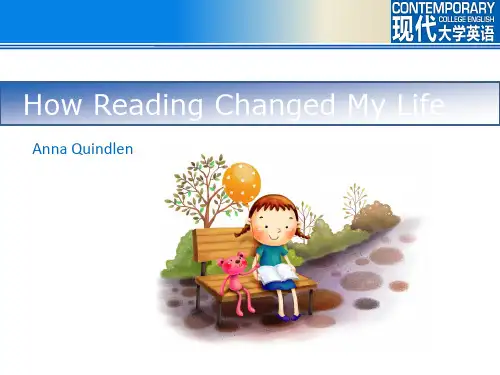
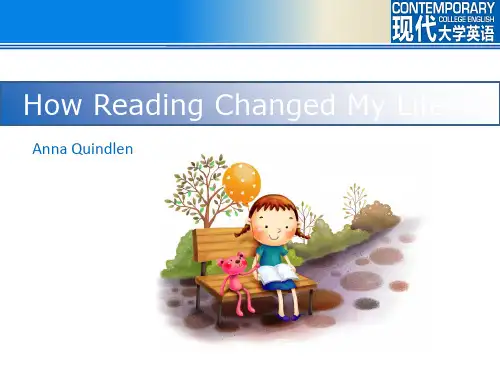
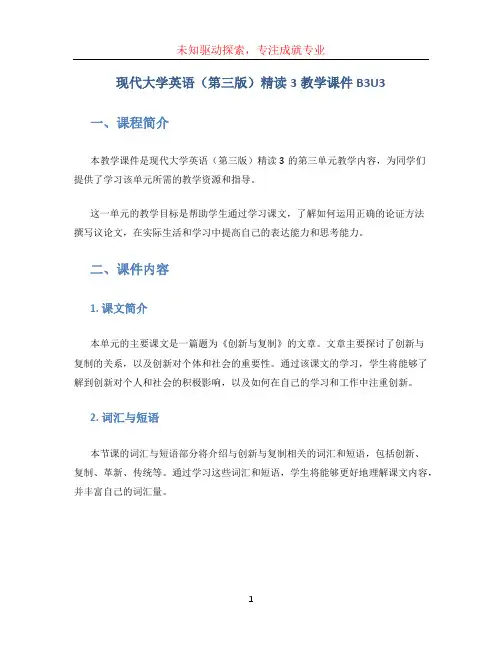
现代大学英语(第三版)精读3教学课件B3U3一、课程简介本教学课件是现代大学英语(第三版)精读3的第三单元教学内容,为同学们提供了学习该单元所需的教学资源和指导。
这一单元的教学目标是帮助学生通过学习课文,了解如何运用正确的论证方法撰写议论文,在实际生活和学习中提高自己的表达能力和思考能力。
二、课件内容1. 课文简介本单元的主要课文是一篇题为《创新与复制》的文章。
文章主要探讨了创新与复制的关系,以及创新对个体和社会的重要性。
通过该课文的学习,学生将能够了解到创新对个人和社会的积极影响,以及如何在自己的学习和工作中注重创新。
2. 词汇与短语本节课的词汇与短语部分将介绍与创新与复制相关的词汇和短语,包括创新、复制、革新、传统等。
通过学习这些词汇和短语,学生将能够更好地理解课文内容,并丰富自己的词汇量。
3. 语法与句型本节课的语法与句型部分将介绍与表达观点和论证相关的语法和句型,包括使用连词引导的从句、使用形容词和副词表达观点等。
学生将通过学习这些语法和句型,掌握如何更准确地表达自己的观点,并展开有效的论证。
4. 阅读理解本节课的阅读理解部分将包括与课文相关的阅读理解题目,帮助学生巩固对课文的理解能力和阅读技巧。
5. 口语练习本节课的口语练习部分将提供与课文和主题相关的口语练习题目,帮助学生进一步提高口语表达能力,在团队讨论和个人演讲等活动中积极参与。
6. 写作任务本节课的写作任务部分将提供一个与课文相关的写作任务,帮助学生锻炼自己的写作能力,以及运用所学的观点论证方法撰写议论文。
三、教学目标1.理解并掌握课文内容,包括词汇、句型以及主题的核心观点。
2.提高听说读写能力,能够正确运用所学的词汇、句型和表达方式。
3.培养学生的批判思维能力和创新意识,在实际生活和学习中注重创新和积极思考。
4.培养学生的团队合作能力和沟通能力,能够积极参与口语练习和写作任务。
四、教学方法1.组织小组讨论,引导学生阅读和分析课文内容,共同探讨课文中的核心观点和人物形象。
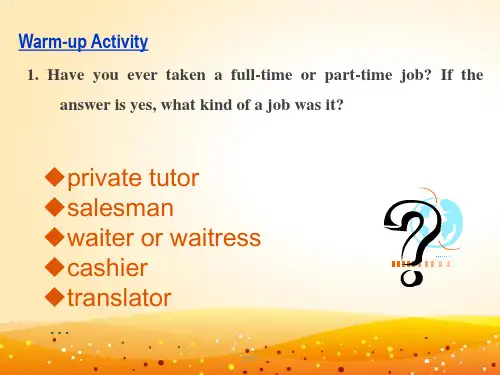
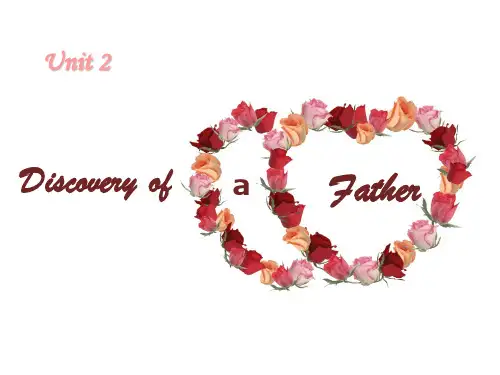
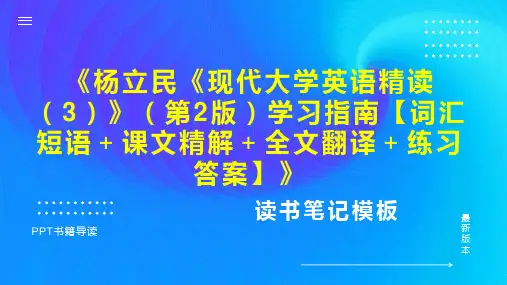
Less on ThreeMore Crimeand LessPunishmentBy RichardMoranIntroductionTopic Discussion: (Brainstorming)1. What do you know about the crime problem in the States?2. What do you think can be attributed to a constant increase in crime nowadays?Suggested AnswerWhat do you know about the crime problem in the States?• 1) Personal property crimes (theft, robbery, mugging , burgling, purse-snatching, shoplifting)economic crimes (embezzlement, smuggling f etc.) politicalcrimes (bribery, terrorism, betrayal) computer crimes (hacking)sexual crimes (rape f sexual harassment) juvenile delinquency(drug-abuse, violence) murdering drug-trafficking Suggested Answer• What do you think can be attributed to a constant increase in crime nowadays?1) poverty (Poverty is the mother of crime.)2) the gap between the rich and the poor3) poor education4) the lack of moral power5) in effective legislati on6) the lack of effective enforcement of lawsSuggested Answer7) ill cultural influence from history or from other countries8) lenient punishment from the police and court9) racial hatred10) money worship11) TV violenceStructure of the text• Introduction: (Paral一3 ) The writer describes how serious the crime problem is in the States and introduces the main idea of the text: punishment does not reduce crime・Structure of the text•Body:(Para 4-— 9) He analyses the reasons why punishme nt does n't deter pun ishment. •Supporting point 1There are too many criminal to be locked up•Supporting point 2.: the public is unwilling to pay for prison construction•Supporting point 3.: Longer prison sentences are not only too expensive to be feasible, but also ineffectual.Structure of the text• Conclusion (Para 10) He restates his argument: getting tough with criminals is not the answer to the crime problem.Writing techniques• 1. How to support an argument•1) by express your opinion clearly in a topic sentence •2) by giving releva nt and accurate reasons or facts as evidenee•3) by showing statistical information•4) by giving examples•5) by giving quotations (not in this text)Writing Techniques•1) Analogy : the comparison of two seemingly unlike things for the purpose of i I lust rati on. The comparis on is possible because the two have something in common.(Para 4)•Eg: Military strategy may bear some similarity to the chessboard.•2) Rhetorical Questions (Para 2)•3) Selective Use of Repetition (Para 6)•4) Frequent use of Statistical informationNew Words and Expressions1. get touch with2. amount to3. under supervision/ under the supervision of4.1ock away / lock up5・ go down / go up6. afford7. give out8. the other way around9. declineNew Words and Expressions10. gain admission to / release / one's approval11. elite12. exclusive13. be soft / easy on sb・14. convict15. have charge of16. dismissNew Words and Expressions17. select18. release19. measure sth. against sth.20. a drop in the bucket21. work out to22. be faced withWords•get tough with : to become harsh / severe/ unyielding with•eg: The school asked the police to get tough with the neighbourhood bullies who were constantly shaking the children down.•据悉,我国有关部门将在春节期间严厉惩办票贩子。